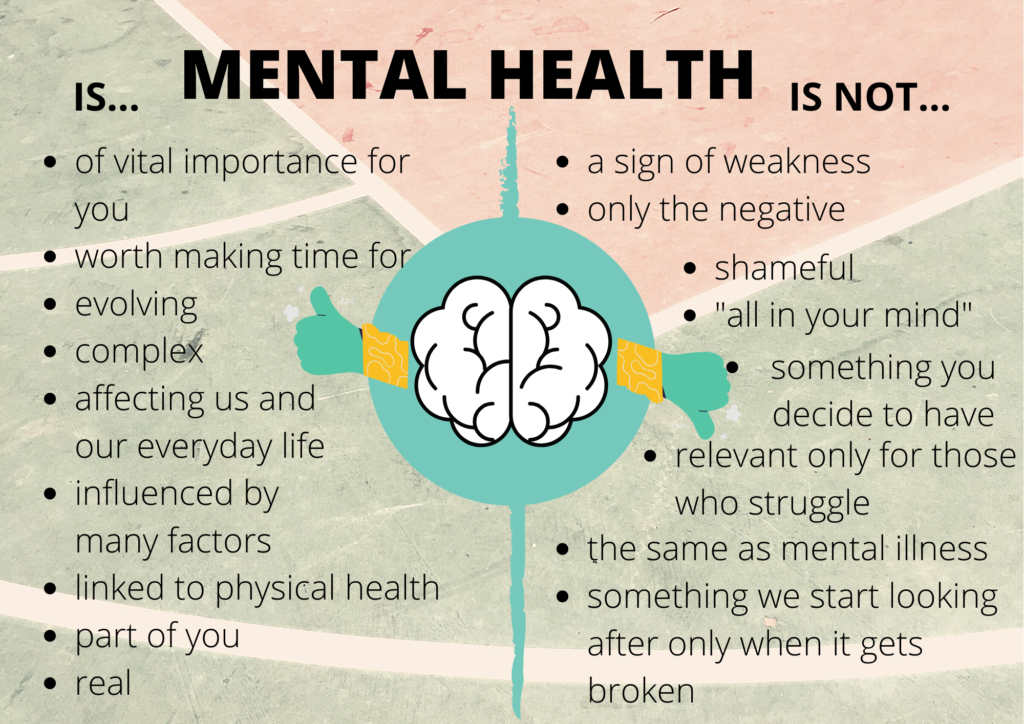Why We Should Take Care of Your Mental Health
Why we should take care of your mental health isn’t just a feel-good phrase; it’s a fundamental truth impacting every aspect of our lives. From our relationships and careers to our physical health and overall well-being, mental wellness plays a crucial, often overlooked, role. Ignoring it can lead to serious long-term consequences, while prioritizing it unlocks a wealth of benefits, fostering resilience, happiness, and a more fulfilling life.
This exploration delves into the multifaceted nature of mental health, examining common challenges like anxiety and depression, and providing practical strategies for self-care and seeking support. We’ll uncover subtle signs of mental health struggles, discuss the importance of building supportive relationships, and challenge the stigma often associated with seeking help. Ultimately, our goal is to empower you to prioritize your mental well-being and cultivate a life filled with greater balance and joy.
The Importance of Mental Wellness
Mental wellness is far more than just the absence of mental illness; it’s a state of well-being where individuals realize their own abilities, can cope with the normal stresses of life, can work productively and fruitfully, and are able to make a contribution to their community. It’s a multifaceted aspect of overall health, significantly impacting our physical, emotional, and social well-being.
Neglecting it carries substantial long-term consequences, while prioritizing it yields significant benefits.
The Multifaceted Nature of Mental Health and its Impact on Overall Well-being
Mental health encompasses our emotional, psychological, and social well-being. It influences how we think, feel, and act. It also helps determine how we handle stress, relate to others, and make choices. Good mental health allows us to enjoy life, achieve our goals, and contribute meaningfully to society. Conversely, poor mental health can manifest in various ways, impacting our relationships, work performance, and overall quality of life.
Long-Term Consequences of Neglecting Mental Health
Ignoring mental health concerns can lead to a cascade of negative effects. Chronic stress, for instance, can weaken the immune system, increasing susceptibility to illnesses. Untreated depression or anxiety can escalate, leading to substance abuse, relationship breakdowns, and even suicidal thoughts. Early intervention is crucial to prevent these serious consequences.
Prioritizing Mental Health Enhances Physical Health
The mind-body connection is undeniable. Stress reduction techniques, like meditation or yoga, have been shown to lower blood pressure and improve cardiovascular health. Regular exercise, a cornerstone of mental wellness, boosts endorphins, improving mood and reducing symptoms of depression and anxiety. Adequate sleep, another crucial element, strengthens the immune system and improves cognitive function.
Prevalence of Mental Health Issues and Their Societal Impact
Mental health issues are widespread. The World Health Organization (WHO) estimates that one in eight people globally experience mental health conditions. These conditions significantly impact productivity, healthcare costs, and overall societal well-being. The economic burden is substantial, highlighting the need for increased investment in prevention and treatment.
Recognizing the Signs of Mental Health Challenges
Recognizing the signs of mental health challenges is the first step towards seeking help. While symptoms vary, some common indicators are often overlooked or dismissed.
Common Symptoms of Anxiety, Depression, and Stress
Anxiety can manifest as excessive worry, restlessness, irritability, and difficulty concentrating. Depression often involves persistent sadness, loss of interest in activities, fatigue, and changes in appetite or sleep. Stress symptoms include headaches, muscle tension, digestive problems, and difficulty sleeping. These are just some of the common signs; many more subtle indicators can exist.
Subtle Signs of Mental Health Struggles Often Overlooked
Subtle signs can include increased social withdrawal, changes in personal hygiene, decreased motivation, difficulty making decisions, and persistent feelings of emptiness or hopelessness. These subtle changes can easily be missed, emphasizing the importance of regular self-assessment and open communication with loved ones.
Impact of Mental Health Challenges on Daily Life, Relationships, and Work
Mental health challenges can significantly disrupt daily life. Difficulty concentrating at work, strained relationships with family and friends, and reduced productivity are common consequences. These challenges can create a vicious cycle, further impacting mental well-being and requiring professional intervention.
Accessibility is a big deal for mental health services, and it’s great to see initiatives exploring different options. For example, check out this article on whether community mental health services will offer pick-up services: will community mental health drive to pick-up clients. This is crucial for those struggling with transportation. On a related note, understanding the points system for mental health conditions in work capability assessments is also important.
If you’re facing this, you might find this resource helpful: work capability assessment how many points for mental health. Navigating these systems can be challenging, so having access to clear information is key.
Resources for Assessing Mental Health
- Self-assessment questionnaires (available online)
- Mental health screenings offered by healthcare providers
- Trusted online resources like the National Alliance on Mental Illness (NAMI) and the MentalHealth.gov website
Practical Strategies for Mental Health Care: Why We Should Take Care Of Your Mental Health
Incorporating self-care practices into daily routines is vital for maintaining mental well-being. This involves actively prioritizing activities that promote relaxation, reduce stress, and enhance overall well-being.
Step-by-Step Guide for Incorporating Self-Care Practices
- Identify your needs: What activities bring you joy and relaxation?
- Schedule self-care: Treat it like any other important appointment.
- Start small: Begin with one or two manageable practices.
- Be consistent: Regularity is key to seeing results.
- Listen to your body: Adjust your routine as needed.
Healthy Coping Mechanisms for Managing Stress and Anxiety
- Exercise regularly
- Practice mindfulness or meditation
- Spend time in nature
- Engage in hobbies
- Connect with supportive friends and family
Effective Communication Techniques for Seeking Support
Communicating your needs effectively involves expressing your feelings clearly and honestly, setting boundaries, and actively listening to others’ perspectives. This requires vulnerability and trust, but the benefits of open communication are immense.
Mindfulness and Meditation Techniques
Mindfulness involves paying attention to the present moment without judgment. Meditation practices, such as deep breathing exercises or guided imagery, can help reduce stress and improve focus. Regular practice can lead to significant improvements in mental clarity and emotional regulation.
Seeking Professional Help and Support
Seeking professional help is a sign of strength, not weakness. Therapists and counselors provide guidance and support, helping individuals develop coping strategies and address underlying mental health issues.
Benefits of Seeking Professional Guidance
Professional help offers personalized support, evidence-based treatments, and a safe space to explore challenges without judgment. Professionals can provide tools and techniques to manage symptoms, improve relationships, and enhance overall well-being.
Finding a Qualified Mental Health Professional
Finding a qualified professional can involve researching therapists in your area, checking credentials, and reading online reviews. Your primary care physician can also provide referrals.
Different Types of Therapy, Why we should take care of your mental health
Various therapy approaches exist, including cognitive behavioral therapy (CBT), dialectical behavior therapy (DBT), and psychodynamic therapy. The best approach depends on individual needs and preferences.
Mental Health Services and Insurance Coverage
Many resources are available to support access to mental health services, including insurance coverage and community-based programs. Understanding your insurance benefits and exploring available resources is crucial for accessing appropriate care.
Building a Supportive Environment
Strong social connections are crucial for mental well-being. A supportive environment provides a sense of belonging, reduces feelings of isolation, and offers a network of individuals who can provide emotional support during challenging times.
Role of Social Connections in Maintaining Mental Well-being
Positive relationships act as a buffer against stress, providing emotional support and a sense of belonging. Strong social connections promote feelings of security and self-worth, fostering resilience and reducing the risk of mental health issues.
Importance of Open Communication and Emotional Support

Open communication involves sharing feelings and experiences honestly and vulnerably, creating a safe space for emotional expression. Emotional support involves actively listening, offering empathy, and providing practical assistance when needed.
Strategies for Fostering Positive Relationships and Building a Strong Support Network
- Nurture existing relationships
- Join groups or clubs based on shared interests
- Volunteer in your community
- Be open to meeting new people
Impact of a Supportive Community on Mental Health Outcomes
A supportive community offers a sense of belonging and reduces feelings of isolation. This sense of connection promotes resilience and improves overall mental health outcomes.
Challenging the Stigma Surrounding Mental Health
Reducing the stigma surrounding mental health is crucial for encouraging individuals to seek help without fear of judgment. Open conversations, education, and positive representation can significantly impact societal attitudes.
Personal Stories Demonstrating the Impact of Mental Health Challenges
A fictional example: Sarah, a successful businesswoman, initially hid her struggles with anxiety, fearing judgment from colleagues. After seeking therapy and opening up to a trusted friend, she found immense relief and support, ultimately leading to a more fulfilling and balanced life. This demonstrates the positive impact of seeking help and breaking the silence.
Effectively Communicating About Mental Health Without Judgment
Empathetic listening, using person-first language (“person with depression,” not “depressed person”), and avoiding stereotypes are essential for fostering understanding and reducing stigma.
Accessibility is a big deal for mental health services, and it’s great to see initiatives exploring transportation options. I was wondering about community mental health services offering rides to clients – you can check out this article on whether they will drive to pick up clients: will community mental health drive to pick up clients. This ties into the complexities of work capability assessments, especially when mental health is involved.
Figuring out how many points are deducted for mental health conditions in these assessments can be tricky; this resource might help clarify things: work capability assessment how many points for mental health. Both access to care and fair assessment processes are crucial for supporting individuals’ well-being.
Campaign to Promote Understanding and Reduce Stigma
A potential campaign could use social media to share personal stories (with consent), host workshops on mental health awareness, and partner with local organizations to promote mental health resources. The campaign’s message should emphasize that mental health is a normal aspect of life, requiring support and understanding.
Role of Education and Awareness in Combating Negative Perceptions
Education plays a vital role in dispelling myths and misconceptions surrounding mental illness. By promoting accurate information and normalizing conversations about mental health, we can create a more supportive and inclusive society.
Maintaining Long-Term Mental Well-being
Maintaining long-term mental well-being requires proactive strategies and a commitment to self-care. Regular self-assessment and a focus on sustainable lifestyle choices are key.
Plan for Long-Term Mental Health Maintenance
This plan should include regular self-reflection, stress management techniques, and proactive steps to address potential stressors. It should also involve seeking professional support when needed and maintaining healthy relationships.
Sustainable Lifestyle Choices Promoting Mental Well-being
- Regular exercise
- Balanced nutrition
- Adequate sleep
- Mindfulness practices
- Meaningful social connections
Identifying and Managing Potential Stressors
Identifying potential stressors involves recognizing triggers and developing coping mechanisms. This may involve time management techniques, setting boundaries, and seeking support when needed.
Importance of Continuous Self-Reflection and Personal Growth

Continuous self-reflection allows for identifying patterns, addressing challenges, and fostering personal growth. This ongoing process promotes self-awareness and enhances resilience, crucial for maintaining long-term mental well-being.
Taking care of your mental health isn’t a luxury; it’s a necessity for a thriving life. By understanding the signs of mental health challenges, implementing self-care practices, and building a strong support system, you can cultivate resilience and navigate life’s ups and downs with greater ease. Remember, seeking professional help is a sign of strength, not weakness. Prioritizing your mental well-being is an investment in your overall health and happiness – a journey worth embarking on for a more fulfilling and meaningful life.
Share this content:
